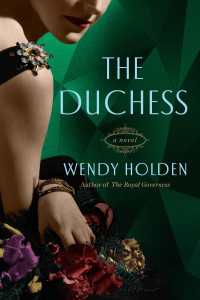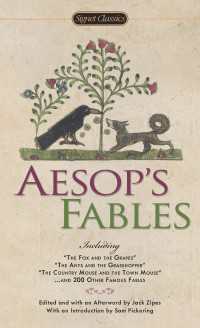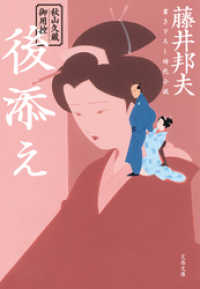- ホーム
- > 洋書
- > 英文書
- > Biography / Autobiography
基本説明
This collection provides an unrivalled overview of Eco's writings and includes a selection from considerations of his contribution to semiotics, literary theory, philosophy of language, the analysis of fiction and narratives, his novels, his critiques of mass culture and communication and his contributions to the theory of laughter, politics and ethics.
Full Description
Umberto Eco is arguably best known for his novel The Name of the Rose yet there is much more to him than simply being an exemplary novelist. Semiotician, literary and media critic, philosopher and historian, Umberto Eco is one of the greatest and most original thinkers working today. He has contributed to many fields and is one of a handful of writers who can claim to be a key public intellectual in Europe. This has made it extraordinarily difficult for commentators to place him in the Western tradition of social thought. This is especially so, because there is a playful quality in his work, exemplified above all by his use of skills and techniques from semiotics, the philosophy of language, medieval life and thought and aesthetics and techniques that he employed to great affect in The Name of the Rose. He has also made seminal contributions in thinking on postmodern developments in culture and epistemology.This collection provides an unrivalled overview of his writings and includes a selection from considerations of his contribution to semiotics, literary theory, philosophy of language, the analysis of fiction and narratives, his novels, his critiques of mass culture and communication and his contributions to the theory of laughter, politics and ethics. The result is the most complete assessment of Eco's contribution and its impact on social, cultural and critical thought.Mike Gane is Professor of Sociology at the University of Loughborough; Nicholas Gane is Senior Lecturer in Sociology and Communications at Brunel University, London.
Contents
VOLUME ONEPART ONE: INTRODUCTION: ECO AND SELECTED OTHER WRITERSCritical versus Fatal Theory - Norma BouchardUmberto Eco contra Jean BaudrillardItalo Calvino and Umberto Eco - Peter BondanellaPostmodern MastersSteeled in the School of Old Acquinas - Jean-Pierre RondasUmberto Eco on the Shoulders of Edgar de BruynPART TWO: SEMIOTICSReeling in the Signs - Scott SimpkinsUnlimited Semiosis and the Agenda of Literary SemioticsThe Predicament of Semiotics - Mieke BalThe Limits of Semiotics - Patrick Colm HoganThe Complexity of the Sign-Giving Process - Flip G DrosteIn the Wake of C S Pierce and U EcoIs Representation Really in Crisis? - Tarja KnuuttilaPART THREE: NARRATION, FORM, INTERPRETATION, READINGEco and His Model Reader - Lubomir DolezelUmberto Eco - William RayThe Reading Process as Code-StructureFragments and Order - Oscar S KenshurTwo Modern Theories of Discontinuous FormThe Pragmatist's Progress - Richard RortyMarks and Noises and Interpretations - Peter LamarquePART FOUR: LITERARY CRITICISM AND TEXTUAL ANALYSESEco and Calvino Reading Dante - Guy P RaffaUmberto Eco, Semiotics and the Merchant's Tale - Carolyn P ColletteOpen and Closed Books - John SimonsA Semiotic Approach to the History of Elizabethan and Jacobean Popular RomanceThe Name of the Horse - Robert L CaserioHard Times, Semiotics and the SupernaturalWho is the Model Reader of Delibes's Cinco Horas Con Mario? - Ann DaviesQuincunxial Sherlockholmesing in 'Grace' - Corinna Del Greco LobnerOn the Contribution of Umberto Eco to Joyce Criticism - Herman van der HeideReading Bond - Tony Bennett and Janet WoollacottOpen and Closed Texts - Allan LukeThe Ideological/Semantic Analysis of Textbook NarrativesEco's Stopwatch and Narrative Time in Puig, Jean-Renaud Camus and Calvino - Heidi StrebelPART FIVE: THEORETICAL FICTIONS: INTRODUCING ECO'S NOVELSWalking and Swimming with Umberto Eco - Guy P RaffaMapping the Complexity in the Fiction of Umberto Eco - Thomas J RiceVOLUME TWOA: Semiotic AnalysisSemiotics and Conjecture in Il nome della rosa - JoAnn CannonEco's Echoes - David RichterSemiotic Theory and Detective Practice in The Name of the RoseSemiotics narrated: Umberto Eco's The Name of the Rose - Werner H llenSign and De-Sign: Medieval and Modern Semiotics - Helen BennettB: Textual StrategiesEc(h)o in Fabula - Walter StephensNaming the Rose - Steven SallisReaders and Codes in Umberto Eco's NovelA Novel, Which Is a Machine for Generating Interpretations - Elizabeth DippleUmberto Eco and The Name of the RosePalimpsests and Laughter - Rocco CapozziThe Dialogical Pleasure of Unlimited Intertextuality in The Name of the RoseC: The Historical NovelThe Invisible Worm - Carl RubinoAncients and Moderns in The Name of the RoseMeta-Psychomachia in Eco's The Name of the Rose - Laurel BrasswellUmberto Eco, Semiotics and Medieval Thought - Adele Haft, Jane White and Robert White'Eco, Sign Theory and the Middle Ages', chapter 1 of Naming the Rose - Theresa ColettiEco, Medieval Sign and Modern TheoryD: Maps and MazesThe Architecture of Umberto Eco's The Name of the Rose - D B JewsonMaps, Mazes and Monsters - Adele HaftAspects of the Labyrinth - Rochelle SibleyE: Gender and DifferenceResurrecting the Feminine in The Name of the Rose - Thomas FrentzLove and Difference in The Name of the Rose - Enzo NeppiGaudy Rose - Teresa De LauretisEco and NarcissismF: Postmodern ThemesThe Name of the Rose as a Postmodern Novel - Mark ParkerThe (post)modernism of The Name of the Rose - Brian McHaleG: Other Authors and NovelsClosure and Infinite Semiosis in Mann's Doctor Faustus and Eco's The Name of the Rose - Evelyn CobleyThe Mirror and Encyclopedia - Christine de LaihacarBorgesian Codes in Umberto Eco's The Name of the RoseThe Literature of Appropriation - Deborah ParkerEco's Use of Borges in Il nome della rosaJorge Borges, Author of The Name of the Rose - Leo CorryEco's Reconstruction of Aristotle's Theory of Comedy in The Name of the Rose - Leon GoldenVOLUME THREEPART EIGHT: FOUCAULT'S PENDULUMPendulum Diary - William WeaverEco's Echoes - Linda HutcheonIronizing the (Post)modernThe Demonics of 'True' Belief - Victoria V. VernonTreacherous Texts, Blasphemous Interpretations, and Murderous ReadersThe Imaginary Universe of Umberto Eco - JoAnn CannonA Reading of Foucault's PendulumCritifictional Epistemes in Contemporary Literature - Norma BouchardThe Case of Foucault's PendulumFoucault's Pendulum and the Text of Theory - Robert PhiddianPART EIGHT: OTHER NOVELSUmberto Eco's L'isola del giorno prima - Norma BouchardPostmodern Theory and Fictional PraxisBaroque Shores of Eco's The Island of the Day Before - Jos[ac]e Sanjin[ac]esThe Island of the Day Before - Joris VlasselaersA Quest for the Semiotic Construction of a SelfUmberto Eco's Baudolino and the Language of Monsters - Cristina FarronatoPART NINE: CULTURE, COMMUNICATION AND MEDIAUmberto Eco's Model of Communication - Gary GenoskoA Juxtapostion of Two Abductions for Studying Communication and Culture - Virginia H. FryUmberto Eco - David RobeyThe Theory and Practice of the MediaReconceptualizing the Encoding and Decoding 'Moments' of the Mass Communication Process - Virgina Fry and Donald H FryPost-Picture and Ec(h)o Effects - Nick PerryEco's Discovery of America or Travelling the Postmodern Way - Vanna MottaBetween Shelves and Columns - Maurizio RebandengoScattered Fragments of a Semiotic DiscoursePART TEN: GENDERSemiosis and Experience - Teresa de LauretisEco, Oedipus and the 'View' from the University - Mary Wilson CarpenterPART ELEVEN: HUMOURA Theory of Medieval Laughter - Cristina FarronattoThe Comic, Humour and WitEco Ridens - Liberat Santoro-BrienzaPART TWELVE: PHILOSOPHYThe Riddle of Umberto Eco - Bernard WilliamsProfessor Whatever - Simon BlackburnPART THIRTEEN: ETHICSReligion and Ethics - Arnold BurnsThe Eco-Martini ExchangeConspiracy Theories and Literary Ethics - Svetlana BuymUmberto Eco, Danilo Kis and the Protocols of Zion








